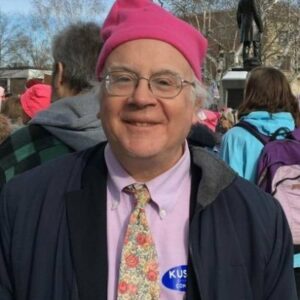When Rep. Timothy Horrigan (D- Durham) testified against a bill to prevent dead people from voting in New Hampshire elections, he spoke from personal experience.
His dead mother voted in January’s First in the Nation presidential primary.
The New Hampshire House Judiciary Committee was debating SB576 on Wednesday. The bill would require executors of estates to inform town clerks of a resident’s passing to help keep voter rolls current and correct. The concern is that ballots, particularly mail-in or absentee ballots, could be submitted on behalf of deceased registered voters.
Like his fellow Democrats on the committee, Horrigan opposed the legislation, agreeing with ranking Democrat Rep. Marjorie Smith (D-Durham) that “this is a bill that is absolutely not necessary.”
Except Horrigan’s own testimony appeared to challenge that premise.
“Just from my own personal experience, my mother passed away shortly before the [2024] presidential primary,” Horrigan told the committee. “In the last conversation she had with me, she said she had indeed sent in an absentee ballot.”
Realizing that he had offered an example of a dead person voting, Horrigan attempted to mitigate the impact.
“But that’s fairly rare. I mean, it’s not a unique situation, but it’s fairly rare,” Horrigan continued. “She was intending to be alive on Jan. 23, but she ended up passing on Jan. 16.”
“That’s probably not something that materially affects the results of the election too much,” Horrigan assured the committee. “I guess in theory, her ballot could have been challenged.”
And besides, he added, “We already have a voter ID thing and other protections. If it was happening frequently there would be a high probability there would be a lot of irregularities on the checklist, and people watch those closely.
“So I think this bill solves a problem that doesn’t really exist. I think it’s unnecessary,” Horrigan concluded.
Republicans pounced.
“I’m sure that I, too, have loved ones voting Democrat from beyond the grave,” quipped House Majority Leader Rep. Jason Osborne (R-Auburn).
Rep. Kristine Perez (R-Londonderry) told the committee the bill was needed because some towns are not keeping their voter rolls current, or getting information about deceased voters to the supervisor of the checklist.
“We had a problem in Londonderry. We had over 1,200 people still on the list who had moved out or died,” Perez said. “They are now off the checklist… This is a safeguard, especially for small towns.”
Perez also noted the supervisor of the checklist is not under the authority of any local elected officials. “They answer to the secretary of state.”
The Public Interest Legal Foundation (PILF), a nonprofit that supports ballot security and election integrity, has been taking states to court for refusing to meet federal standards for protecting their voter rolls.
“When legislators oppose even the most sensible election reforms, like this one, it shows how reactionary some have become,” said PILF president J. Christian Adams. “Dead voters should be removed from the rolls. Sensible tools like this one help that happen.”
Adams’ organization is currently in court challenging the state of Michigan over “failing to make a reasonable effort to remove deceased registrants from the voter rolls” as required by the National Voter Registration Act.
PILF found more than 26,000 deceased registrants on Michigan’s voter rolls. “Of these, 17,479 registrants had been dead for at least a decade, and 3,956 registrants had been dead for at least two decades,” it reported.



